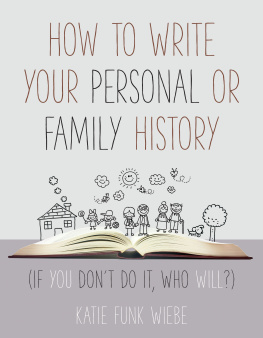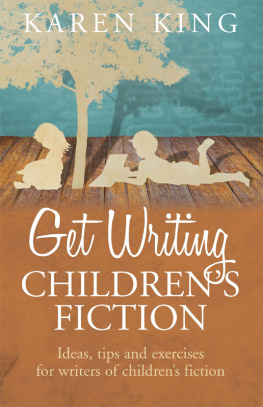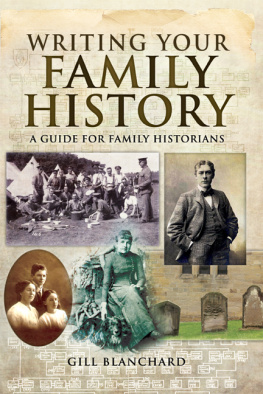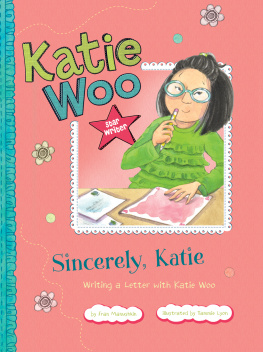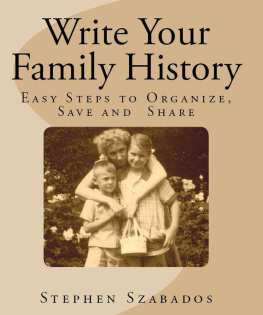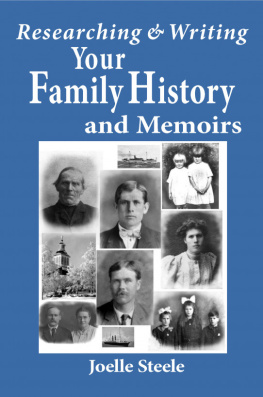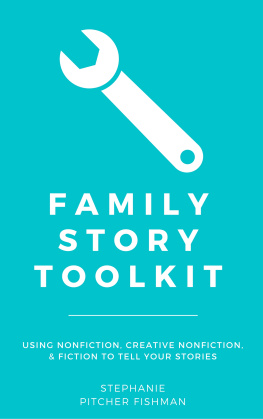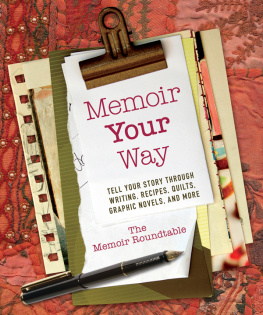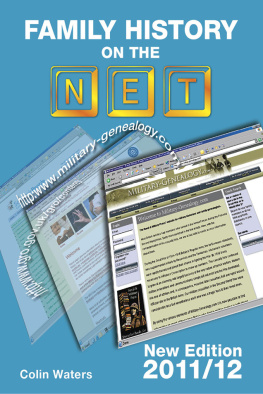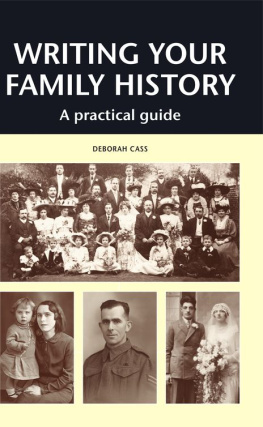HOW TO WRITE YOUR PERSONAL OR FAMILY HISTORY
Copyright 2017 by Good Books, Inc.
All rights reserved. No part of this book may be reproduced in any manner without the express written consent of the publisher, except in the case of brief excerpts in critical reviews or articles. All inquiries should be addressed to Good Books, 307 West 36 th Street, 11 th Floor, New York, NY 10018.
Good Books books may be purchased in bulk at special discounts for sales promotion, corporate gifts, fund-raising, or educational purposes. Special editions can also be created to specifications. For details, contact the Special Sales Department, Good Books, 307 West 36 th Street, 11 th Floor, New York, NY 10018 or .
Good Books is an imprint of Skyhorse Publishing, Inc., a Delaware corporation.
Visit our website at www.goodbooks.com.
10 9 8 7 6 5 4 3 2 1
Library of Congress Cataloging-in-Publication Data available on file.
ISBN: 978-1-68099-182-6
eBook ISBN: 978-1-68099-185-7
Cover design by Jane Sheppard
Interior photos courtesy of the Centre for Mennonite Brethren Studies, Winnipeg, Collection NP145: Katie Funk Wiebe Photo Collection. Available at https://archives.mhsc.ca/katie-funk-wiebe-photo-collection
Printed in the United States of America
T ABLE OF C ONTENTS
Take from the altar of the past the fire, not the ashes.
Jean Juares
F OREWORD
Katie Funk Wiebe is a teller of true stories and one of the most well received Mennonite voices of her time. When I visit a Mennonite congregation, I have come to expect a pleased response when I introduce myself as the daughter of this beloved writer.
She has been named one of the twenty most influential Mennonites of the twentieth century. A comprehensive bibliography of her writings and oral presentations takes up nearly one hundred pages in The Voice of a Writer: Honoring the Life of Katie Funk Wiebe , a collection of essays describing her contribution to the thought and life of the Mennonite and Anabaptist community. This book was presented to her in 2010 at a Festschrift event, sort of like a Nobel Prize for the Mennonite universe, at Tabor College, Hillsboro, Kansas, where Katie taught English and journalism for twenty-four years. She retired in 1990.
Many describe the effect of her teaching, speaking, and writing as encouraging. But how does Katie gain her own courage and conviction to persist in speakingand seekingtruth? Why does she believe in the power of written language? Why does she teach and invite people to write their memoirs and family histories?
As Katie grew up, words in the form of family stories and letters were the lifeline that held a far-flung family together, a family with no hope of ever seeing one another again. Words helped them hold absent family members in their hearts.
Joanna Wiebe
P REFACE
Writing this book was a labor of love, a passion. My interest in encouraging people to write their personal or family histories began in 1978 when the head of the social work department at the college where I was teaching asked me to teach an enrichment course in writing for older adults. I was having trouble keeping my English composition students inspired. How could I inspire people three times their age who had been out of school for forty or more years? What approach would work with this group?
As I researched possible writing topics, I realized that the greatest riches of this group of somewhat subdued yet still with-it people were their own life experiences. For six weeks I invited, cajoled, and encouraged my class of eighteen grey-haired men and women to write about what life had handed them. Their enthusiasm for having a coach to guide themat a time when memoir-writing as a way to pass on personal legacy was just becoming popularinspired me to do more.
Out of this short teaching experience came my book Good Times with Old Times: How to Write Your Memoirs , which was in print for several decades.
After I retired from college teaching, I took time to research my own family story with greater energy. I traveled to the former USSR, even to Siberia, to find relatives who had all but disappeared into the Russian landscape. I read voraciously everything I could get my hands on about how my ancestors had lived in another culture, as well as in Canada and the United States. From this research came my books The Storekeepers Daughter , sections in Border Crossing , and several self-published books about the lives of close relatives. I wrote my autobiography, You Never Gave Me a Name: One Mennonite Womans Story .
When a memoir-writing instructor at LifeVentures retired, I stepped in. This interfaith organization in Wichita, Kansas is designed to enrich the lives of post-retirement men and women by offering courses and activities.
How to Write Your Personal or Family History is the result of my years of teaching, preparing handouts, answering questions, clarifying problems, and enjoying these writers who have been engaged in life reviewan important task for older people. Since the first edition was published in 2009, I have heard from people of all ages who have enthusiastically embraced this same task. I have revised this second edition to be useful to someone in any generation. Youll find writing tips, examples of writings (some my own and others by class members), and occasional assignments.
A great fear of new writers is the blank page. What to write? The writing of a personal or family history is not a weekend project, but one that will take months and possibly years. The process of researching, discovering, and synthesizing may well be the greatest joy and accomplishment of your life.
Katie Funk Wiebe
CHAPTER 1
Y OU H AVE A S TORY W AITING TO B E T OLD
Whats new? Whats going on in your life? your friend asks. Not much, you say. Your date book shows only ordinary activities, such as picking up dry cleaning, phoning George regarding the board meeting, or going with Jeanie to the PTA meeting. If your house had burned down, if you had won the lottery, or endured a major plumbing breakdown, youd have something to say. But beyond this daily routine, your mind goes blank.
Yet youve been living twenty-four hours every day, making decisions, objecting to certain ideas, endorsing others, and interacting with family and coworkers. In effect, just living. If you took time to reflect, youd find lots of meaningful stuff going on.
Personal or autobiographical writing, in any of its many forms, asks you to think not only about actions (a trip to the dentist) but also feelings, attitudes, and motives and to put all of this into words. It invites you to select a few of all your experiences and give them shape and order. A reader generally is not interested in a trip to the dentist unless, perhaps, that dentist had a heart attack and died in the middle of the drilling, and you reacted in a noteworthy way. A reader is interested in the reasons why you voted a certain way at the board meeting against majority opinion, or why you switched from business to truck gardeningor gave up on both. Readers are interested in how you have handled change or conflict.
Television writers or novelists have the luxury to decide plot development beforehand. If they wish, they can give houses and cars by the dozen to the main characters. They can choose their enemies and handicaps. If they dont like one ending, they can change it, or even kill off the protagonist and any supporting characters. A writer of personal history cant do that. Your life is what it is. But it is every bit as worthwhile and unique as that of a college president or climber of Mount Everest.

